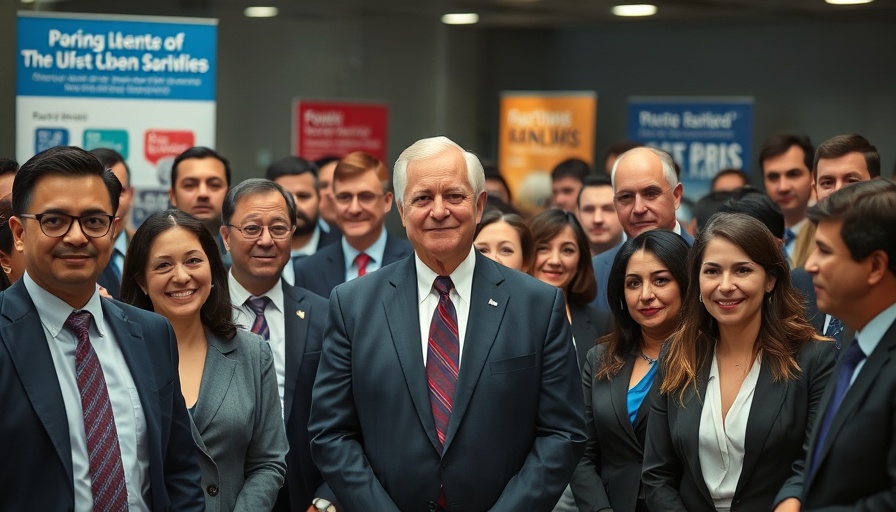
Political Tensions Rise in Edo State Over Threats Against Peter Obi
The political landscape in Edo State has grown increasingly tumultuous following threatening remarks directed at former Anambra governor Peter Obi. While appearing in a video clip that circulated widely on social media, Edo State Governor Godwin Obaseki issued a stark warning to Obi, stating that he would not guarantee Obi's safety should he decide to visit the state. This incident has reignited discussions surrounding political freedom, human rights, and the volatile nature of Nigerian politics.
In 'Okpebholo Denies Threatening Peter Obi,' the discussion dives into political threats in Edo State, sparking deeper analysis on the implications for Nigerian democracy.
The Significance of Political Rhetoric in Nigeria
This announcement is not merely a fleeting moment in Nigerian political discourse; it signifies a potential shift in how political figures interact with one another and their constituents. In a democratic society, threats against opposition figures pose dangerous implications, as they can incite violence and intimidation. Governor Obaseki's words drew immediate criticism, with observers warning that such rhetoric risks inflaming already tense political sentiments in a country where many citizens yearn for stability and respect for democratic principles.
Historical Context: A Pattern of Hostility
This is not the first time a Nigerian politician has faced threats over political beliefs or actions. Previous incidents of political intimidation have been observed, particularly during election cycles when tensions escalate. For instance, similar threats were issued by politicians from other states against Obi in the past, reinforcing a troubling precedent within Nigeria's political realm. Such behaviors raise questions about governance, accountability, and the fundamental rights of Nigerian citizens.
A Call for Political Accountability
The social media backlash against Obaseki's remarks suggests a growing frustration among Nigerian citizens who are tired of leaders who employ hateful or inflammatory language to rally support. As highlighted by political analysts, this kind of rhetoric not only undermines democratic institutions but also jeopardizes the safety of citizenry, intensifying the climate of fear and division. It urges citizens to hold public officials accountable for their statements and assures that public discourse should reflect the values of respect and engagement.
Public Reactions: A Nationwide Outcry
Social media has been alight with reactions to Obaseki's threats against Obi, with many calling for a reevaluation of political discourse in Nigeria. Dr. Moses Paul, chairman of the African Democratic Congress, articulated the sentiments of many when expressing that Obi's freedom of movement is a fundamental right as a citizen of Nigeria. Another commenter articulated shock at the public admission of hatred for Obi from the APC chairman in Edo State, showcasing the depth of political division and its dangerous ramifications for national unity.
Implications—What Lies Ahead for Edo State?
The climate surrounding political events in Edo State reflects a broader issue of political governance in Nigeria. As President Muhammadu Buhari contemplates future engagements and political stability initiatives, it remains essential for politicians to embark on a campaign of reconciliation rather than division. The threats made by Governor Obaseki and his counterparts cannot go unchallenged; they serve as a critical reminder that Nigerian citizens must demand better from their leaders.
Moreover, as citizens call out these political transgressions, it is crucial to explore the mechanisms through which citizens can safeguard their civil rights in the face of political intimidation. In advocating for unity and understanding, Nigeria can work toward restoring dignity and morality in its political framework.
A Response to the Upsurge in Hatred
The images portrayed through social media reflect the dangers attached to a divided populace. With widespread discontent directed towards politicians who incite fear rather than unity, Nigeria is at an inflection point. Issues surrounding freedom of movement, political representation, and social justice resonate far beyond regional disputes. They echo the need for democracy anchored in inclusivity and respect.
In light of unfolding events, citizens and political leaders alike are called upon to navigate this challenging political terrain thoughtfully and responsibly. There must be an unyielding push against any narrative that emphasizes division, force, or threats over constructive dialogue. As Nigeria seeks to emerge as a leader on the African continent, the political actors in the country must adopt a more humane approach to governance and civic engagement.
To this end, it is time for all stakeholders in Nigerian politics to coalesce around the vital need for harmony. The challenges facing Edo State may signify a microcosmic reflection of national debates — one that requires immediate attention and dialogue at every level of government.
 Add Row
Add Row  Add
Add 


Write A Comment